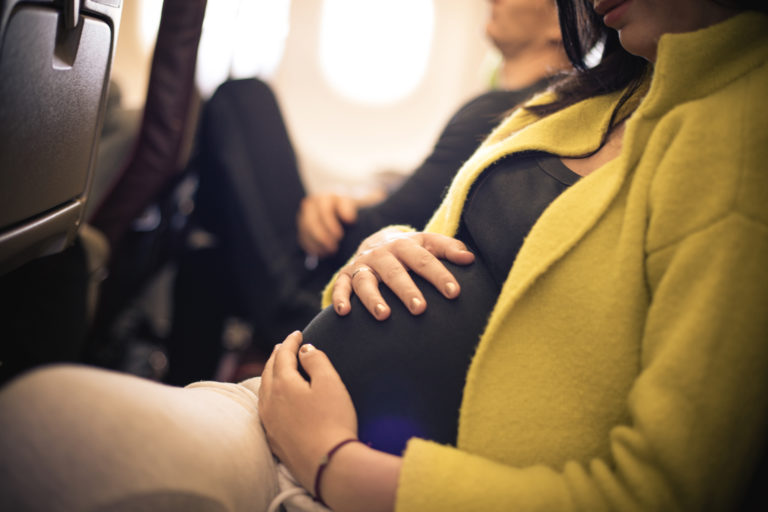As the pandemic-era travel restrictions are lifted, you may be dreaming of a vacation away from home. Where can you safely go while pregnant? What activities can you safely engage in? Let’s explore safe travel during pregnancy.
Safe Travel by Trimester
Each trimester of pregnancy presents different considerations for safe travel and your own medical history and risks may affect your options. No matter your stage in pregnancy, you may want to discuss your travel plans with your pregnancy care provider. They can help you make decisions based on your health and pregnancy considerations.
First Trimester Travel
In the first trimester (weeks 1-12), morning sickness, fatigue, and the frequent need to go to the bathroom may dampen your desire to travel. The motion of a car, bus, or cruise ship may worsen morning sickness. If you have a history of miscarriage or threatened miscarriage, travel during your first trimester may need to be avoided. However, the first trimester may also be a time where the normal physical changes of pregnancy are less obvious and allow you to continue to enjoy activities that you did before you were pregnant. Although bathroom trips may be more frequent and need to be planned for, if you are healthy, travel is considered safe during the first trimester of pregnancy.
Second Trimester Travel
The second trimester (weeks 13-26), or mid-pregnancy, may be the best time to travel. Morning sickness has usually resolved or is less severe, your energy has returned, and the baby and your uterus is small enough to allow you to move around easily. Also, cruise ships and airlines have fewer restrictions for travel during this trimester.
Third Trimester Travel
As you approach the last couple months of pregnancy, during the third trimester, the physical changes in your body are the most evident and may make travel more uncomfortable and possibly more challenging. Long car rides and flights may be both strenuous and uncomfortable and may put you at an increased risk for blood clots. This is also a time when airlines and cruise ships have the greatest restrictions for travel during pregnancy. For example, most cruise lines won’t permit travel after 24-28 weeks of pregnancy. Most airlines will allow travel up to 36 weeks of pregnancy but may require a note from your pregnancy care provider stating that you are fit to travel beyond 36 weeks of pregnancy. International flights may restrict travel after 28 weeks. Check with your airline for their restrictions and speak with your pregnancy care provider to see if you are safe to travel. As you approach the last few weeks of your pregnancy, you may want to select travel destinations closer to home, decreasing travel time and keeping you closer to your planned birthing provider and location. With a bit of careful planning and possibly an adjustment to your activities or destination, you can ensure that you and your baby are safe and comfortable during travel.
Pregnancy Concerns that May Restrict Travel
You may be advised not to travel if you have any of the following concerns or history:
- Premature (preterm) labor
- Early cervical changes (where the cervix opens too early during pregnancy)
- History of bleeding, placental abruption, or placenta previa in pregnancy
- High blood pressure
- History of early pregnancy loss
- History of going into labor early in previous pregnancies
- Severe nausea or morning sickness
Healthy Pregnancy Travel Tips
- Discuss your travel plans with your pregnancy care provider to help determine your safest options
- Avoid travel to areas where you might be exposed to Malaria, Zika virus, or other communicable diseases
- Know where you can get pregnancy care at or around your travel destination
- Plan to frequently wash your hands and use hand sanitizer if soap and water are not available
- Wear a seat belt when traveling in all forms of transportation, including cars, buses, and planes – place the lap strap below your belly and the shoulder strap (if available) above your belly
- Plan for frequent stops or opportunities to walk around, go to the bathroom, and to stretch and move your legs
- Wear comfortable clothes that are not too tight or restrictive and comfortable shoes
- Consider compression socks to help reduce swelling in your feet and lower legs
- Stay hydrated – drink plenty of water. Make sure your travel destination has access to safe drinking water – if in doubt, bottled water is recommended
- Take healthy snacks with you for the trip
- Pack a health kit including any prescription medication, prenatal vitamins, antacids, or anti-nausea medications that you might need to have at hand. Don’t forget your sunscreen
- Avoid activities that put you at risk for falling or injury, as well as activities that are bumpy or jarring – for example, rock climbing, off-roading, riding ATVs or jet skis, water or snow skiing
- Swimming and snorkeling are generally safe activities, but experts recommend avoiding scuba diving during pregnancy
- Routine vaccinations for influenza (flu), COVID-19, and Tdap are usually recommended by obstetric providers prior to travel, and additional vaccinations may be recommended depending on your destination. Check with your obstetric provider for their recommendations so you can make an informed decision
YOU MAY ALSO LIKE: Doula’s Speak Out – Helping Moms Reclaim Their Power






Comments are closed.